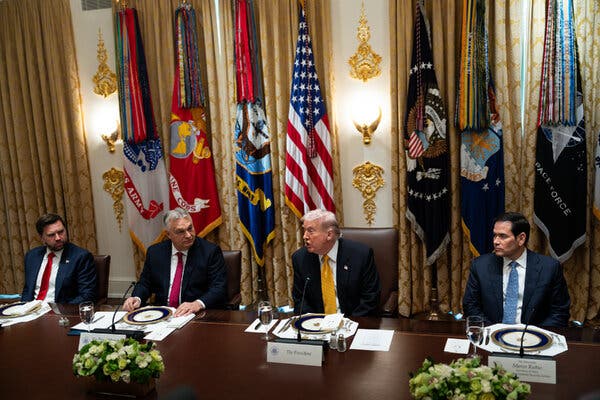President Donald Trump has granted Hungary a one-year exemption from sanctions the United States imposed on countries purchasing Russian oil. This decision followed a meeting with Hungarian Prime Minister Viktor Orban at the White House on March 15, 2024. The exemption is part of a series of agreements aimed at addressing Hungary’s energy needs amid ongoing sanctions against Russia, which were implemented to pressure Moscow to end its war in Ukraine.
The announcement was made by a White House official who requested anonymity to discuss the agreement. This exemption represents a significant development for Mr. Orban, who is facing a challenging re-election campaign. Shortly after the meeting, he took to social media to reveal that Trump had “guaranteed full sanction exemptions” for Hungary’s major pipelines, TurkStream and Friendship. Orban stated that this would enable Hungary to maintain the lowest energy prices in Europe.
Energy Agreements and Economic Implications
In addition to the sanctions exemption, Hungary has also committed to purchasing liquefied natural gas from the United States, with contracts valued at approximately $600 million. This move comes as Hungary grapples with the impact of U.S. sanctions imposed last month on Russia’s largest energy companies, which Orban warned could devastate Hungary’s already sluggish economy.
Hungary remains heavily reliant on Russian energy, importing about 86 percent of its oil from Russia, a situation compounded since the onset of the conflict in Ukraine in 2022. During the meeting, Orban emphasized that Hungary faces fewer options than its European neighbors, largely due to its dependence on existing pipeline infrastructure.
Mr. Trump expressed understanding of Hungary’s predicament, noting the country’s landlocked status and lack of access to ports, which complicates its energy procurement. “It’s a great country, it’s a big country, but they don’t have sea,” Trump remarked, indicating his willingness to accommodate Hungary’s unique challenges.
Geopolitical Context and Reactions
The exemption is a notable concession from Trump, as it involves significant sanctions intended to curb Russian funding amidst its military actions in Ukraine. The sanctions are among the most impactful measures the U.S. has enacted against the Russian energy sector since the conflict began. Trump has consistently urged European nations to cease oil purchases that bolster the Russian military, yet Hungary’s situation has led to a different approach.
While granting this exemption, Trump criticized other European countries for their continued purchases of Russian oil, expressing concern over their compliance with U.S. sanctions. The exemption underscores the complex geopolitical relationships in play, particularly between nations navigating their own energy dependencies while responding to global pressures.
Orban’s previously expressed admiration for Russian President Vladimir Putin and his controversial views on Ukraine, including calls for territorial concessions to secure peace, further complicate Hungary’s position within the European Union. As diplomatic relations between Hungary and the U.S. strengthen, the implications for European unity regarding energy sanctions against Russia remain to be seen.
This development marks a pivotal moment in U.S.-Hungarian relations, particularly as both leaders navigate internal and external pressures ahead of upcoming elections and geopolitical challenges.
